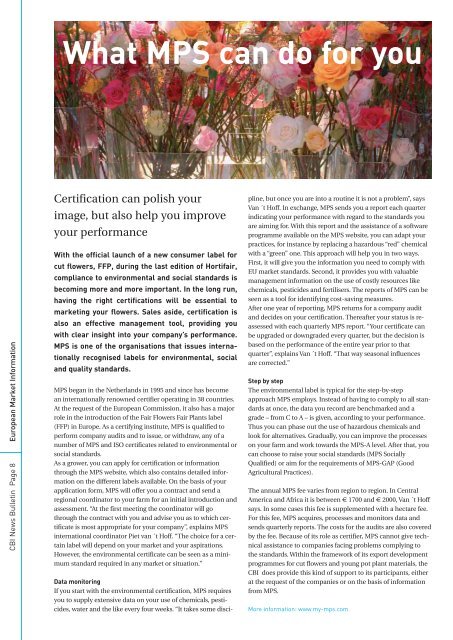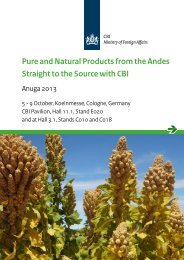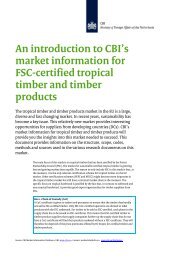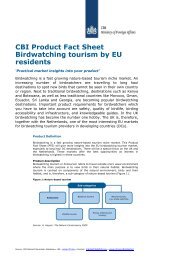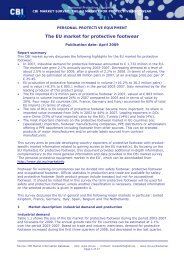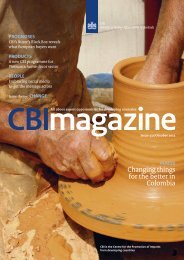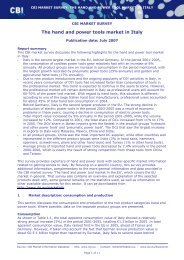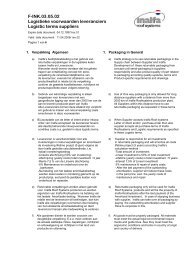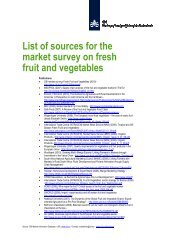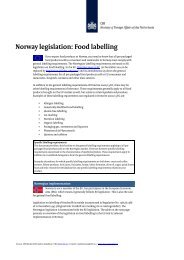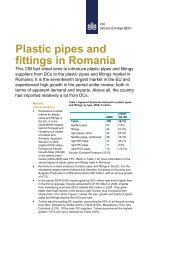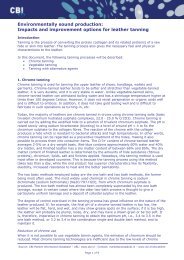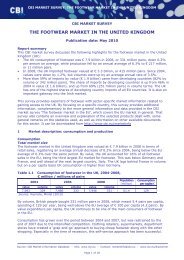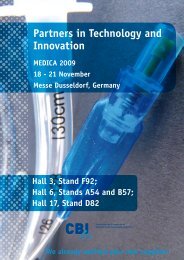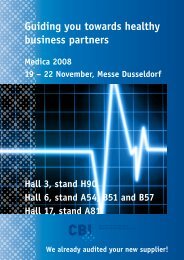CBI News Bulletin November / December 2005
CBI News Bulletin November / December 2005
CBI News Bulletin November / December 2005
Create successful ePaper yourself
Turn your PDF publications into a flip-book with our unique Google optimized e-Paper software.
<strong>CBI</strong> <strong>News</strong> <strong>Bulletin</strong> Page 8 European Market Information<br />
What MPS can do for you<br />
Certification can polish your<br />
image, but also help you improve<br />
your performance<br />
With the official launch of a new consumer label for<br />
cut flowers, FFP, during the last edition of Hortifair,<br />
compliance to environmental and social standards is<br />
becoming more and more important. In the long run,<br />
having the right certifications will be essential to<br />
marketing your flowers. Sales aside, certification is<br />
also an effective management tool, providing you<br />
with clear insight into your company’s performance.<br />
MPS is one of the organisations that issues internationally<br />
recognised labels for environmental, social<br />
and quality standards.<br />
MPS began in the Netherlands in 1995 and since has become<br />
an internationally renowned certifier operating in 38 countries.<br />
At the request of the European Commission, it also has a major<br />
role in the introduction of the Fair Flowers Fair Plants label<br />
(FFP) in Europe. As a certifying institute, MPS is qualified to<br />
perform company audits and to issue, or withdraw, any of a<br />
number of MPS and ISO certificates related to environmental or<br />
social standards.<br />
As a grower, you can apply for certification or information<br />
through the MPS website, which also contains detailed information<br />
on the different labels available. On the basis of your<br />
application form, MPS will offer you a contract and send a<br />
regional coordinator to your farm for an initial introduction and<br />
assessment. “At the first meeting the coordinator will go<br />
through the contract with you and advise you as to which certificate<br />
is most appropriate for your company”, explains MPS<br />
international coordinator Piet van ´t Hoff. “The choice for a certain<br />
label will depend on your market and your aspirations.<br />
However, the environmental certificate can be seen as a minimum<br />
standard required in any market or situation.”<br />
Data monitoring<br />
If you start with the environmental certification, MPS requires<br />
you to supply extensive data on your use of chemicals, pesticides,<br />
water and the like every four weeks. “It takes some disci-<br />
pline, but once you are into a routine it is not a problem”, says<br />
Van ´t Hoff. In exchange, MPS sends you a report each quarter<br />
indicating your performance with regard to the standards you<br />
are aiming for. With this report and the assistance of a software<br />
programme available on the MPS website, you can adapt your<br />
practices, for instance by replacing a hazardous “red” chemical<br />
with a “green” one. This approach will help you in two ways.<br />
First, it will give you the information you need to comply with<br />
EU market standards. Second, it provides you with valuable<br />
management information on the use of costly resources like<br />
chemicals, pesticides and fertilisers. The reports of MPS can be<br />
seen as a tool for identifying cost-saving measures.<br />
After one year of reporting, MPS returns for a company audit<br />
and decides on your certification. Thereafter your status is reassessed<br />
with each quarterly MPS report. “Your certificate can<br />
be upgraded or downgraded every quarter, but the decision is<br />
based on the performance of the entire year prior to that<br />
quarter”, explains Van ´t Hoff. “That way seasonal influences<br />
are corrected.”<br />
Step by step<br />
The environmental label is typical for the step-by-step<br />
approach MPS employs. Instead of having to comply to all standards<br />
at once, the data you record are benchmarked and a<br />
grade – from C to A – is given, according to your performance.<br />
Thus you can phase out the use of hazardous chemicals and<br />
look for alternatives. Gradually, you can improve the processes<br />
on your farm and work towards the MPS-A level. After that, you<br />
can choose to raise your social standards (MPS Socially<br />
Qualified) or aim for the requirements of MPS-GAP (Good<br />
Agricultural Practices).<br />
The annual MPS fee varies from region to region. In Central<br />
America and Africa it is between € 1700 and € 2000, Van ´t Hoff<br />
says. In some cases this fee is supplemented with a hectare fee.<br />
For this fee, MPS acquires, processes and monitors data and<br />
sends quarterly reports. The costs for the audits are also covered<br />
by the fee. Because of its role as certifier, MPS cannot give technical<br />
assistance to companies facing problems complying to<br />
the standards. Within the framework of its export development<br />
programmes for cut flowers and young pot plant materials, the<br />
<strong>CBI</strong> does provide this kind of support to its participants, either<br />
at the request of the companies or on the basis of information<br />
from MPS.<br />
More information: www.my-mps.com.


